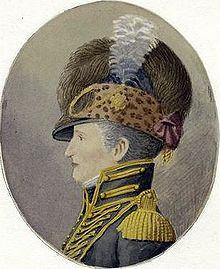Wade Hampton I
| Wade Hampton I | |
|---|---|
 |
|
| Member of the U.S. House of Representatives from South Carolina's 4th district |
|
|
In office March 4, 1803 – March 4, 1805 |
|
| Preceded by | Richard Winn |
| Succeeded by | O'Brien Smith |
| Member of the U.S. House of Representatives from South Carolina's 2nd district |
|
|
In office March 4, 1795 – March 3, 1797 |
|
| Preceded by | John Hunter |
| Succeeded by | John Rutledge, Jr. |
| Personal details | |
| Born | 1752 |
| Died | February 4, 1835 |
| Political party | Democratic-Republican |
| Profession | planter, soldier, politician |
| Military service | |
| Allegiance |
|
| Service/branch |
|
| Years of service | 1777 - 1781; 1808 - 1814 |
| Rank | Major general |
| Battles/wars |
American Revolutionary War 1811 German Coast Uprising War of 1812 |
Wade Hampton (1752 – February 4, 1835) was a South Carolina soldier, politician, two-term U.S. Congressman, and wealthy planter. He was the scion of the politically important Hampton family, which was influential in state politics almost into the 20th century. His second great-grandfather Thomas Hampton (1623–1690) was born in England and settled in the Virginia Colony.
Hampton served in the American Revolutionary War as a lieutenant colonel in a South Carolina volunteer cavalry regiment. He was a Democratic-Republican member of Congress for South Carolina from 1795 to 1797 and from 1803 to 1805, and a presidential elector in 1801.
He was appointed to the US Army as Colonel of Regiment of Light Dragoons in October 1808, and was promoted to Brigadier General in February 1809, appointed as the top military officer in the Territory of Orleans.
He used the U.S. military presence in New Orleans to suppress the 1811 German Coast Uprising, a slave revolt which he believed was a Spanish plot. In the same year, he purchased The Houmas, a sugar plantation in Ascension Parish, Louisiana. This may have been a gift for his daughter and son-in-law, as the son-in-law was managing the plantation by 1825.
...
Wikipedia
